- Home
- Skylar Dorset
Girl Who Never Was Page 16
Girl Who Never Was Read online
Page 16
“That’s not the prophecy I heard,” I point out.
“As if there’s only one prophecy about anything. As if there is only one choice for you to make. You are surrounded by choices, child. You can do as you wish, and each choice brings with it its consequences. Now you are here though, and the choices have disappeared. They have won. You are their prize.”
“But I’m prophesied to—”
“Didn’t you just hear me?” she interrupts me sharply. “That’s not how it works. You were supposed to bring peace, you and the other three fays of the seasons, if you’d met each other, if you’d joined each other. But separately, the prophecy was always that you would fall to the side of the Seelies. It is in your blood. There was no guarantee it would all turn out to be the prophecy we wanted. How foolish everyone is. How foolish. How foolish.” She suddenly brings up her hands and covers her face with them, as if in agony. “It all went wrong, and you are here, and it is all over. It is all over.”
I don’t know what to say. I don’t know what to do. I want to say it’s not true, that I have not shifted the prophecy, but I think of how much my aunts and the Threader didn’t want me to come here, and maybe it’s true—maybe I’ve ruined everything forever.
“But why does it have to be me? Aren’t there four fays of the seasons? Where are the rest?”
“They’re still hidden, of course. You’re the only one who has asked the right questions. So far.”
Well, I’m tired of it just being me. I want the rest of them to be put into the same impossible situations I’m finding myself in. “Hidden where?”
“No one knows that, of course, except the faerie who hid them.”
“And who was that?”
“You would need the book to know that.”
“What book?”
“A Pickle for the Knowing Ones.”
Well, now she isn’t even making any sense at all. I give up entirely on this pointless topic of conversation.
“I don’t want to be part of a prophecy,” I hear myself say. “I just want to be me. I don’t want all these consequences hanging off of everything I do.”
Gussie lifts her head out of her hands and looks at me. “And now you sound just like a Seelie,” she remarks. “Let the past be in the past. No consequences, so no regrets. No memory to remember any of it.”
***
Gussie leaves after condemning me as sounding like a Seelie, and with that ringing through my head, I peel off my clothing and spread it out as best I can on one of the fluffy carpets, hoping that it will dry off. Then I put Ben’s sweatshirt back on, because I don’t dare take it off for more than a few moments, and crawl into bed. The sky is just beginning to lighten from black to navy. I have time—I think, because it’s so hard to tell with the way time moves here—before my mother comes to get me, but I don’t know what to do with this time. I feel that I need to figure out the rest of our plan. I can make a silver bough, I think, if Gussie’s instructions on that point are correct, but what good will that do me? She’s right that I don’t know what to do with the silver bough once I make it. And I’d been so excited about getting the silver bough. So had Ben. And we had neither of us thought through the fact that we’re still stuck in here with a silver bough. It doesn’t let us leave; it just lets other people come in.
The plan—or the lack of a plan—whirls itself around and around in my head until I feel like I am going mad. There is nothing I can do, nothing I can think of; I cannot think of it any longer. I turn my head into my pillow and wish desperately to just stop thinking about all of these things, for just a little while. It would be such a relief to just quiet my brain and stop thinking.
CHAPTER 22
“You changed,” says my mother when she glides into my room that morning.
“My clothes have seen better days,” I tell her. My clothes do not seem to be drying, and I wonder if the rain falling on Ben is enchanted to be even wetter than normal rain. I have bundled them up, in all their guilty drippingness, and stuck them under the bed, and I’ve pulled on one of the jingle-bell lined Seelie dresses I found in my room’s armoire. And I’ve topped it all off with the sweatshirt, of course, which seems to be drying better than the rest, maybe because it’s enchanted. But my mother shouldn’t be able to see the sweatshirt. My mother should just see my jingle-bell dress.
My mother smiles, but it is as chilly as her smiles always are. “Look at you,” she announces. “You look more like a proper Seelie already. Ready to take your rightful place.”
I follow her as she dashes down corridors. The route is a different one and unfamiliar, but we emerge into the same central bright room. I am convinced the walls themselves move here.
I sit in the room and pick at breakfast. I do not think about planning my escape. I am exhausted by the idea. I just need a break from it. I need to think about other things for a little while.
Gussie arrives at breakfast and sits next to me. She seems subdued, and I wonder if she is thinking of the things she said to me last night or this morning, or however time is moving here. Her hands shake as she reaches for a copper goblet to drink from.
I watch them in concern. “You okay?”
“Fine,” she whispers, although she’s so pale that even her lips are white. “I’m fine.”
I glance at my mother, who is busy pulling yarn out of the air, behind which is the uneven flash of one of the named faeries, drifting away through madness. I look back at Gussie and lower my voice. “Have some water.”
“I said too much last night,” she says, her eyes darting nervously around the room. “I remembered too much last night.” She puts her fingers up to her temples and closes her eyes as if she has a terrible headache. “I haven’t remembered so much in ages. I shouldn’t have…I shouldn’t have…”
“Yes,” I agree. “It makes your head hurt, doesn’t it? Just stop for a little while. Give yourself a break.”
Gussie looks over at me. “A break.”
And then there is a commotion at the other end of the room. I turn to see what’s happening, and what’s happening is that two bear-like animals dressed in copper armor are carrying in two wriggling, screaming bundles. A murmur goes up from the Seelies all around us. Excitement. Something happening!
I am caught up in it too. Everything here had felt stifled and stalled and stuck, but now there is something actually happening. I follow the knot of Seelies instinctively, walking over to where the bear-creatures drop the bundles to the ground.
One is a little boy. He cannot be more than three or four. He sits on the hard marble floor and sobs. And the other is…the little girl who asked me for the fusel when I first arrived in the Otherworld. She kneels next to the little boy and pulls him up against her protectively, and I think of Safford, telling me about the little brother she was devoted to.
The little girl is also crying hysterically, but she is speaking, looking up at the Seelies all around her. “Please no,” she is begging. “Please. I said to take me instead. Please.”
“Foolish child,” my mother rebukes her coldly. “You thought we would bargain?”
“Please,” cries the little girl, cuddling her brother in more tightly. “Please.”
“What is his name?” asks my mother of the little girl.
When she doesn’t immediately answer, my mother leans forward and tips the little girl’s head up, not unkindly. And she says, “Tell me his name.”
And the little girl does. I blink in surprise, but she says in a dull monotone, “Trevor Suddington Lamp North.”
My mother smiles and nods. “And what is your name?”
“Milla Doenna Nimble North.”
My mother straightens and steps back, and the little girl flinches, and suddenly she is sobbing hysterically again, and I realize that my mother must have enchanted the answers out of her.
And then my mo
ther says, very slowly and with a great deal of intent, intent that I can feel in the shiver of the air, “Trevor Suddington Lamp North.”
And where there was a little boy being hugged by a little girl, there is nothing, suddenly, but a pile of dandelion fluff and a flash in the air that might make you look twice. There is a wail, not just from the little girl but from underneath the air somehow, and I think of the murmur of sobbing from all the mad, flimsy faeries in the corners of my eye. Their grief is a roar that threatens to overwhelm me.
My mother looks at the little girl, curled into a ball, because the dandelion fluff that had been her brother is gone, has drifted off into the air, is floating all around us, barely visible. She is sobbing as if her heart has broken.
My mother says, almost casually, “Milla Doenna Nimble North.”
And there is no more sobbing from the little girl because there is no more little girl. There is a slant of dust motes in the air, dancing in the sunlight. And underneath, for just a moment, I can hear the pulsing crying of all the other named faeries.
There is, meanwhile, a murmur of pleasure from the Seelies, and I can understand why, because I can feel it too, a charge in the air, like a buzzing jolt of electricity. Power, suddenly, all around, tangible, and I feel like if I leaned into it, it would feel fantastic. But I don’t lean into it. I am holding myself so stiffly that I feel like I could shatter. My hands, I realize, are clenched into tight fists by my sides.
My mother turns and smiles at me, her translucent eyes lit up with a cruel and terrible delight that makes me feel ill. “Isn’t it delicious?” she says to me.
“What did they do?” I ask.
My mother blinks at me, obviously confused. “‘Do’?” she echoes.
“Why were they named?”
My mother makes a little shrug. “Why not?”
***
I can feel my heart pounding in my ears the remainder of the interminable day. Or the day goes by in a blink. I can’t tell. Time is different here. It doesn’t work right. It’s both too fast and too slow all at once, and I can’t explain it, but for some period of time that I can’t determine after the naming, I sit, frozen and trying not to seem frozen. My mother is looking at me suspiciously, and I try to relax. Because I was relaxed earlier. I had stopped thinking about Ben, stopped worrying about a plan to escape. I had told myself I was taking a break, but I had started to forget. I had just been sitting in the bright, central room, relaxed, telling Gussie to relax. I was becoming a Seelie, just like Gussie had said, and that would have been that prophecy fulfilled, the Seelies would have cemented power, they would have been in power forever, naming innocent faeries who had done nothing just because they could.
And I know my mother had relaxed upon seeing me relaxed. I don’t want to signal in any way that I am now back to thinking about the other prophecy, the one where I escape and I destroy this court.
I think of all the things that people have told me about the Seelie Court. I remember. I remember the little girl whose parents had been stolen and who was just trying so desperately to protect her little brother. I remember Safford, condemned for no reason. I remember Ben, wet and shivering and dependent on me to find our way out of here. I remember my aunts, trembling in Boston, terrified to live because of the threat of the Seelies hanging over us. I remember my father, driven mad by my mother for the crime of wanting a baby.
And I remember all the faeries I haven’t met, all the creatures dwelling in the Otherworld just trying to go about normal lives, trying to live, the way Ben’s father had been in his sunny, meadow world. How many more of them are there out there? And does it really all depend on me getting out of here, to give them their lives, to let them love and laugh and do as they please, to let them go where they wish and see the things they wish to see and protect their little brothers and adore their little daughters?
If it is all depending on me, on my choice, then I have to make it. I have to make the right one.
When I get to my room, I go to my windowless window. I stare out at the ocean. I close my hands around the history book pages in my sweatshirt pocket. I don’t want to forget. I am not going to forget. Words have power, I think, so I say it out loud, to the sea and the sky.
“I am Selkie Stewart,” I say firmly. “I am not Seelie. I am not ogre. I am simply me. Selkie Stewart of Boston.”
It happens then, something flying toward me, at first just a dark speck against the sky, and then it gets closer and closer.
It’s a bat.
It lands right on my windowsill and sits there, frowning at me and, granted, my acquaintance with bats is a severely limited one, but I have only met one type of bat that looks this grouchy.
Could the Sewing Circle reach me here? They’re connected to the Otherworld, I know, but could a bat get through to Tir na nOg? Is a bat a faerie? Maybe a bat’s not not a faerie? And maybe that’s enough? My head hurts.
I kneel next to the windowsill and stare intently at the bat, as if it is going to start talking. It would be very convenient if it turned out to be a talking bat. But it just keeps on frowning at me, stubbornly silent.
“Are you from the Boston Sewing Circle?” I whisper.
The bat blinks at me. Maybe it’s Morse code or something. Too bad I don’t know Morse code. I should have grabbed a Morse code dictionary to put in my pocket to take on this trip with me. You have to know a lot of random stuff to have a successful adventure, I think, and then wonder vaguely if I’m on the verge of becoming completely hysterical.
“Can you get a message out of here for me?” I ask, still keeping my voice to a whisper.
The bat blinks again.
I chew on my lower lip and consider. It’s the best chance I have, I decide. Maybe this is some kind of Seelie bat. Maybe nothing is going to happen. But maybe it is from the Boston Sewing Circle. On the other hand, can I even trust the Boston Sewing Circle? The Threader and I didn’t part on the best of terms. But I don’t know what else to do, what my other options might be.
I scramble to my feet and tear toward the desk in the room, wondering if it will have mundane things in it like paper and pen. It does, even if the pen is a feather pen that has to be dipped in an inkwell. Good enough. My luck is holding. Maybe this is part of the prophecy kicking into gear.
I frown at the lantern perched on top of the desk, wondering how it works, wanting to be able to see better as I try to make a silver bough. I lean forward, intending to feel around for a switch of some sort, but it flares into light with a noise like the striking of a match as soon as I touch it.
Convenient, I think, and then I pull out of my pocket the shard of glass wrapped in tissue and the threaded needle. Well. Here goes nothing.
I need a Threader needle, a piece of glass, and my blood, I think. I unwrap the glass and position my finger over it, and then I carefully prick my finger with the needle. A droplet of blood wells up at the tip of my finger and then drops to the glass. And the glass glows white-hot. I half expect it to be hot to the touch when I reach out to smear the blood along it. It is not, but it seems to drink in my blood, and its glow fades to a faint throb. With any luck, I have just made a silver bough. Although it still just looks like a piece of broken glass. Maybe “silver bough” is meant figuratively. Metaphorically. Poetically.
I dip the pen in the inkwell and press it to the paper. This is a silver bough, I write. I feel like that needs to be explained; I wouldn’t know what to make of this package if I received it. I certainly would never guess that this piece of nondescript broken glass is a silver bough. Come to Tir na nOg right away. Bring a church bell. —Selkie.
It takes an excruciatingly long time to write these few sentences. I do not know how people dealt with having to dip their pens in ink all the time. And it keeps leaving huge blobs of ink all over the place. But finally, I finish the note. I make sure it’s legible through the inkblots the
n carefully fold it around the piece of glass, making it as secure as I can. Then I write on the front, very clearly, in all caps, TRUE STEWART. VIRTUE STEWART. ETHERINGTON STEWART. WILLIAM BLAXTON. C/O BOSTON / PARSYMEON. I underline all of it, just to make sure.
I walk over to the bat. “This needs to go to my aunts. Or Will Blaxton. Whoever you can find. And if you can’t find one of them, then my father. But it would be better with my aunts or Will Blaxton.” I enunciate exaggeratedly. The bat looks offended at this. But then again, the bat always looks vaguely offended. I pierce through the piece of paper with the Threader’s needle and use the string to tie it around the bat’s leg. The bat stands patiently until I am done, and then I remind it, “The Stewarts of Boston. Or Parsymeon. Whatever. They’re ogres. Or William Blaxton. He’s a wizard. I think.”
If a bat could huff with indignation, this bat would. But it simply takes flight, and I watch it, until the moment when it seems to disappear into the sky—hopefully flying into the world where there is Boston.
Maybe help is on the way. I curl up on the windowsill and look at the outline of the island on the horizon.
CHAPTER 23
Dawn comes again, another night done. I don’t dare tempt fate by seeking out Ben again. I want my mother to think I am forgetting, relaxing, becoming a Seelie. I want her to think it is her prophecy coming true. I go to eat breakfast, but this time I am determined not to relax, determined not to forget. I make myself keep thinking of Ben, keep thinking of my plan. If I have sent a silver bough to Boston, then someone will be coming, and I need to be prepared. I need to be ready.
Gussie sits next to me. She still looks pale and tired and drawn. The display of naming the day before—or the hour before, because who knows how time is moving?—helped neither of us.
I am on the verge of saying something supportive when my mother screams. And when I say she screams, I mean she screams, a shriek rising up above us, expanding, feeling as if it is sucking all of the air out of the room.

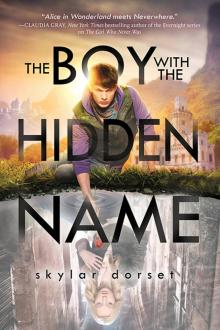 The Boy with the Hidden Name
The Boy with the Hidden Name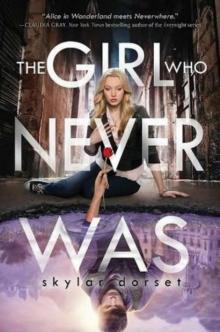 The Girl Who Never Was
The Girl Who Never Was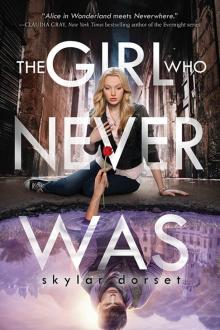 Girl Who Never Was
Girl Who Never Was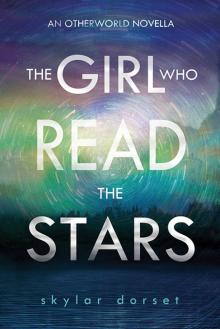 Girl Who Read the Stars
Girl Who Read the Stars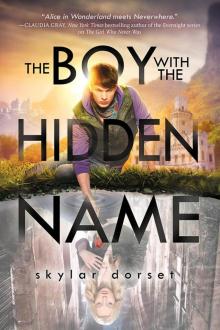 The Boy with the Hidden Name: Otherworld Book Two
The Boy with the Hidden Name: Otherworld Book Two